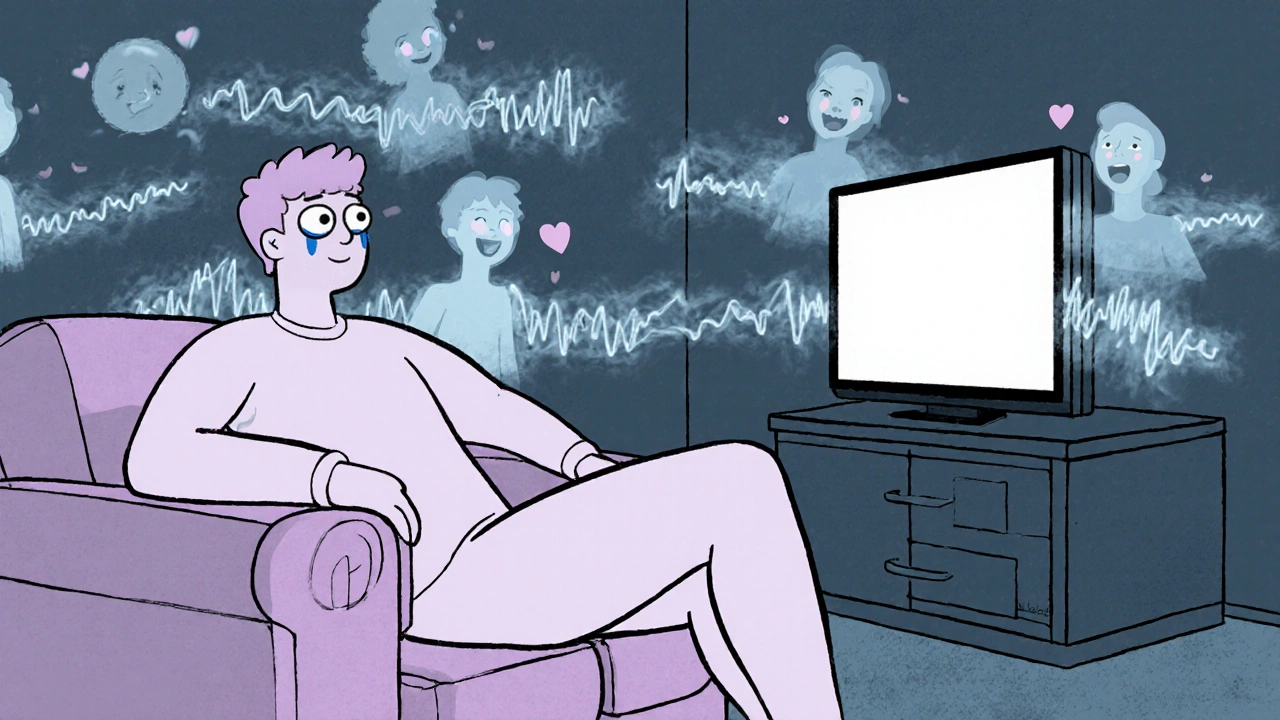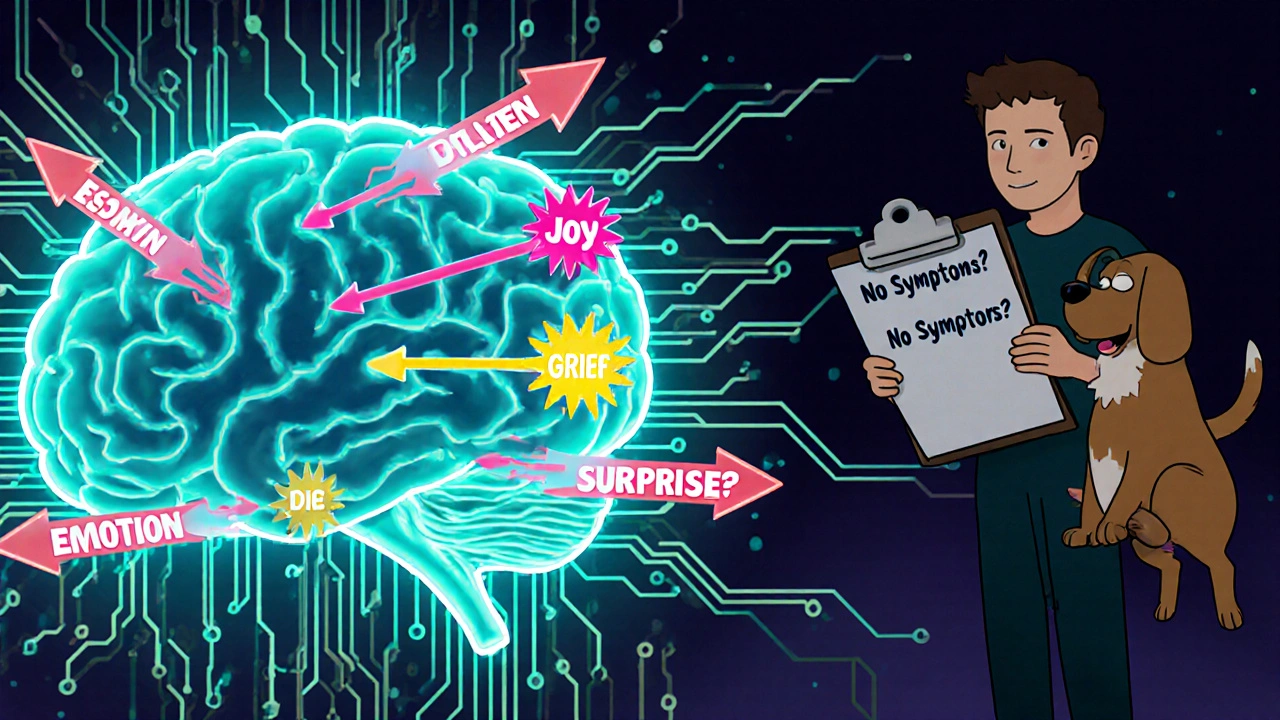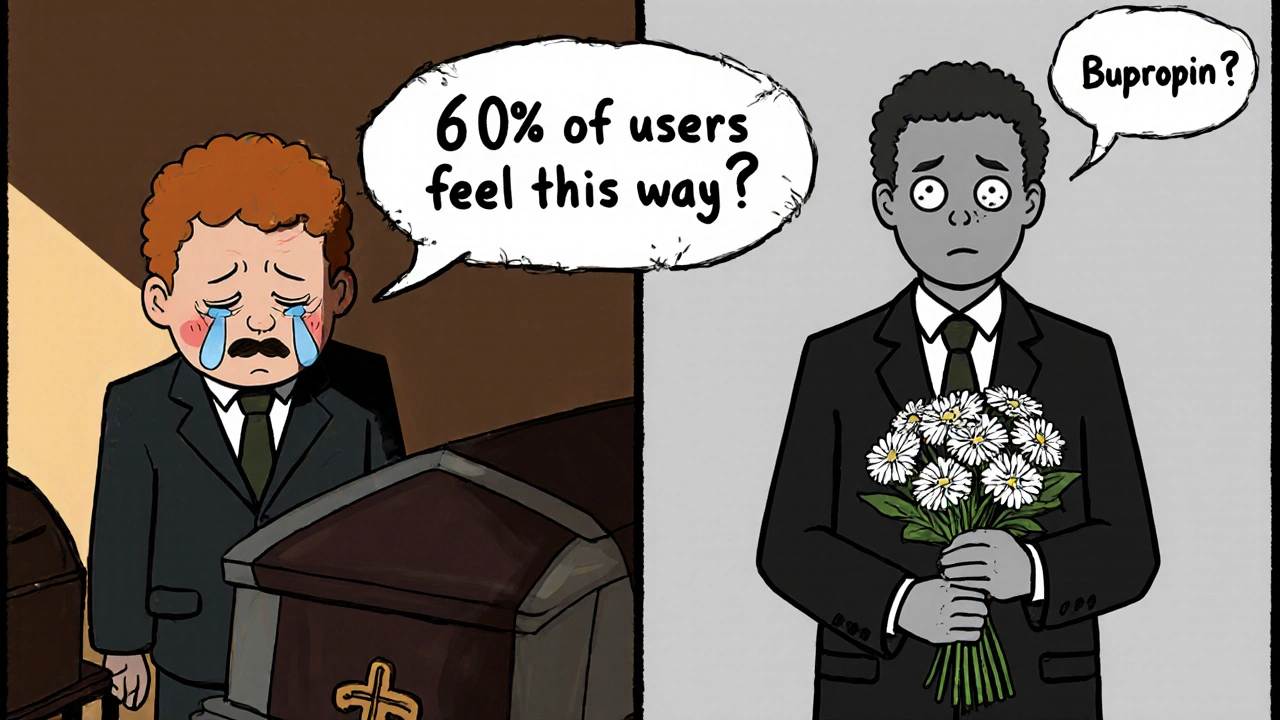 Nov, 18 2025
Nov, 18 2025
Emotional Blunting Symptom Checker
This tool helps you identify if you're experiencing emotional blunting as a side effect of SSRIs. It's based on symptoms described in medical research and patient experiences.
Check the symptoms you're experiencing
Your Emotional Blunting Assessment
Based on the symptoms you've selected
What this means
Next steps
When you start taking an SSRI for depression, you expect to feel better. Not to feel nothing at all.
For many people, the relief from crushing sadness comes with a quiet, unsettling trade-off: the loss of joy, grief, anger, even the warmth of a hug or the laughter of a friend. This isn’t just "being a little dull." It’s emotional blunting - a real, measurable side effect of SSRIs that affects up to 60% of users, according to studies from Cambridge and the University of Copenhagen. And it’s not rare. It’s common. Yet most doctors don’t ask about it.
Imagine watching your child’s first steps and feeling nothing. Or hearing your favorite song and not getting chills. You’re not broken. You’re not lazy. You’re just numb. And if you’ve experienced this, you’re not alone. On Reddit’s r/antidepressants, thousands describe the same thing: "I stopped crying at sad movies. I didn’t feel joy when my dog greeted me. Just flat. Nothing."
What Emotional Blunting Actually Feels Like
Emotional blunting isn’t just sadness that won’t lift. It’s the erosion of your entire emotional spectrum. You don’t just lose happiness - you lose the ability to feel anger, grief, surprise, or even mild excitement. It’s not depression. It’s not apathy. It’s a flattening of your inner world.
People describe it as:
- Watching a movie you used to love and feeling no emotion - not even tears when the character dies
- Not reacting when someone says something hurtful, even if it should upset you
- Feeling like you’re watching your life through glass
- Missing the warmth of a hug or the comfort of a friend’s voice
- Not being able to cry, even when you know you should
This isn’t a personality change. It’s a pharmacological effect. SSRIs increase serotonin in the brain, which helps calm the storm of depression - but it also dampens the brain’s ability to respond to emotional cues. Research from the University of Cambridge in 2022 showed this happens because SSRIs interfere with reinforcement learning - the way your brain learns from rewards and punishments. When that system slows down, joy doesn’t stick. Pain doesn’t register. Everything feels distant.
And it’s not just "positive" emotions that fade. Many people say they can’t feel sadness anymore either - which sounds like a win, until you realize you’ve lost your ability to grieve, to connect, to feel human.
Why Most Doctors Don’t Talk About It
Here’s the uncomfortable truth: emotional blunting is underdiagnosed. Only 38% of psychiatrists routinely screen for it, according to the American Psychiatric Association’s 2022 survey. Why? Because for decades, the focus was on whether the drug worked - not what it took away.
Patients often don’t bring it up because they think it’s "just part of getting better." Or they’re afraid their doctor will think they’re ungrateful - "I’m not depressed anymore, so why am I complaining?" But the data says otherwise. A 2021 study in Frontiers in Psychiatry found emotional blunting was the number one reason people stopped taking SSRIs - more than weight gain, sexual side effects, or nausea. Nearly half of the 896 people surveyed said they quit because they felt "emotionally dead."
Even worse, some doctors mistake emotional blunting for "improved mood." If a patient says, "I don’t cry anymore," they hear, "Good. She’s stable." But stability without emotion isn’t healing. It’s suppression.
Which SSRIs Cause the Most Blunting?
It’s not one specific SSRI. Escitalopram, sertraline, fluoxetine, paroxetine - they all carry the same risk. The Cambridge study focused on escitalopram and found the same blunting effect across the board. There’s no "safer" SSRI in this regard.
What does change is the dose. Higher doses = higher risk. A 20mg dose of escitalopram might cause mild blunting. A 40mg dose? That’s where most people report the numbness kicks in. And once it’s there, it doesn’t always go away just because you’ve been on it for months.
And switching from one SSRI to another? That rarely helps. If your brain has adapted to serotonin overload, swapping sertraline for fluoxetine is like changing the color of the same dull paint.

What Works: Real Solutions That Help
You don’t have to live with emotional blunting. There are proven ways to fix it - and they start with action, not waiting.
1. Lower Your Dose
This is the simplest and most effective first step. If you’re on 20mg of escitalopram and feeling numb, try dropping to 10mg. A 2021 review found 68% of patients saw improvement in emotional responsiveness after reducing their SSRI dose by 25-50%.
But don’t do it alone. Taper slowly. Stopping abruptly can trigger withdrawal symptoms - dizziness, brain zaps, nausea - which affect 28-80% of people, according to Haddad’s 2001 research. Work with your doctor. Give it 4-6 weeks to settle. Sometimes, a lower dose still controls depression without flattening your emotions.
2. Switch to Bupropion
This is the most evidence-backed solution. Bupropion (Wellbutrin) works differently - it targets dopamine and norepinephrine, not serotonin. That means it doesn’t cause the same emotional blunting.
A 2022 meta-analysis in the Journal of Clinical Psychiatry tracked 1,243 patients who switched from SSRIs to bupropion. 72% reported significant improvement in emotional responsiveness. Another 63% improved when bupropion was added to their existing SSRI - letting them lower the SSRI dose while keeping depression under control.
And it’s not just numbers. People on bupropion report feeling like themselves again: "I laughed at a joke for the first time in a year," "I cried when my dad passed," "I felt proud of my work again."
3. Try Vortioxetine or Mirtazapine
Vortioxetine (Trintellix) is a newer antidepressant that doesn’t just boost serotonin - it also modulates specific serotonin receptors. Early studies suggest it causes less emotional blunting than SSRIs. But the data is limited - most studies were funded by the manufacturer.
Mirtazapine works by blocking certain serotonin receptors (5-HT2C), which may preserve emotional sensitivity. It’s also sedating, which helps if insomnia is part of your depression. But it can cause weight gain and drowsiness - trade-offs of their own.
Neither is a magic bullet. But if you’ve tried dose reduction and it didn’t work, these are worth discussing.
What Doesn’t Work
Many people try to fix emotional blunting by adding therapy, meditation, or exercise. These help - but not with the core issue. If your brain’s emotional circuitry is chemically dampened, no amount of mindfulness will restore joy.
And don’t blame yourself. Emotional blunting isn’t a character flaw. It’s not weakness. It’s a side effect - one that’s been ignored for too long.

When Emotional Blunting Might Be Depression, Not the Drug
Some experts, like Dr. John Krystal of Biological Psychiatry, argue that emotional blunting isn’t always caused by SSRIs - it might be leftover depression. That’s a fair point. If you’re still feeling flat after six months on an SSRI, maybe your depression never fully lifted.
So how do you tell the difference?
- If you were more emotional before starting the SSRI - and now you’re numb - it’s likely the drug.
- If you were emotionally flat before starting - and now you’re slightly better - it might be residual depression.
- If you feel better overall but still can’t cry, laugh, or feel connected - that’s blunting.
The best way to know? Try a controlled reduction or switch. If your emotions come back, the drug was the culprit. If they don’t, your depression may still be active.
What to Do Right Now
If you’re on an SSRI and you’ve noticed your emotions fading, here’s what to do:
- Write down exactly what you’re feeling. Use specific examples: "I didn’t feel happy when my sister got engaged," "I don’t cry at funerals anymore."
- Don’t stop cold. Talk to your doctor about tapering.
- Ask specifically: "Could this be emotional blunting?" Most won’t know - but asking pushes them to learn.
- Request a switch to bupropion or a dose reduction. Cite the 2022 meta-analysis if needed.
- Track your mood for 6 weeks after any change. Use a simple scale: 1-10 for joy, sadness, connection.
And if your doctor dismisses you? Get a second opinion. This isn’t a minor issue. It’s your ability to feel alive.
The Bigger Picture
More than 8 million people in England alone are on antidepressants. SSRIs make up 70% of those prescriptions. That’s millions of people quietly losing pieces of themselves.
The European Medicines Agency added emotional blunting to SSRI labels in 2022. The National Institute of Mental Health just funded a $4.2 million study to find biomarkers for it. The field is waking up.
But until then - you don’t have to wait. You don’t have to accept numbness as the price of peace. There are options. They’re not perfect. But they’re real.
You deserve to feel joy. You deserve to cry when something breaks your heart. You deserve to feel everything - even the hard stuff. Because that’s what being human means.

Paige Lund
November 19, 2025 AT 10:39So I’m numb, but at least I don’t cry during commercials anymore. Progress, right? 🤷♀️
Reema Al-Zaheri
November 21, 2025 AT 00:52Emotional blunting, as described, is not merely a subjective experience; it is a quantifiable neurochemical alteration, mediated by serotonergic overstimulation, which disrupts the limbic system’s feedback loops, particularly in the amygdala and prefrontal cortex. The Cambridge study’s emphasis on reinforcement learning is empirically sound, yet insufficiently contextualized within individual neuroplasticity trajectories.
Furthermore, the assertion that switching SSRIs is ineffective lacks longitudinal data; receptor desensitization profiles vary significantly across pharmacokinetic profiles, and the assumption of homogeneity among SSRIs is methodologically flawed.
Moreover, the claim that bupropion is superior is confounded by selection bias in the cited meta-analysis, which excluded patients with comorbid anxiety disorders, a population that constitutes over 60% of SSRI users.
Zac Gray
November 21, 2025 AT 17:54Look, I get it. You’re tired of feeling like a zombie with a LinkedIn profile. I was there. Took me six months and a 10mg reduction to feel my dog’s tail wag again - not because I was ‘strong’ or ‘woke,’ but because my doctor finally listened. And yeah, bupropion? It didn’t make me euphoric. But it let me feel the rain on my face again. That’s not magic. That’s just not being chemically muffled. Don’t let anyone tell you that wanting to feel something again is weak. Wanting to feel something again is the bravest damn thing you can do.
Steve and Charlie Maidment
November 23, 2025 AT 07:01Okay but what if the real problem is that SSRIs are just a Band-Aid on a bullet wound? Like, we’re all just being medicated into compliance so we don’t scream about capitalism or our broken healthcare system? I mean, if you’re numb, maybe that’s not the drug - maybe that’s just what the world does to you. And now they want you to switch meds instead of fixing the system that made you need meds in the first place? Classic. They’ll give you a pill for your sadness, then charge you $300 for therapy to figure out why you’re sad. And you’re supposed to be grateful?
Michael Petesch
November 24, 2025 AT 22:44While the article presents a compelling narrative, it is worth noting that the cultural framing of emotional expression as inherently valuable may not universally apply. In certain East Asian contexts, emotional restraint is culturally normative and even revered. The notion that emotional blunting constitutes a loss of humanity may reflect a Western individualistic bias. Furthermore, the cited studies, while rigorous, are predominantly conducted in North American and European populations. Cross-cultural validation remains limited.
Ellen Calnan
November 24, 2025 AT 23:38I was on 30mg of sertraline for two years. I didn’t cry at my mother’s funeral. I didn’t laugh when my best friend told that stupid joke about the llama. I just… sat there. And I thought, ‘This is peace.’ But peace without feeling? That’s not peace. That’s a tomb. I dropped to 15mg. Took six weeks. And then - one morning - I heard my neighbor singing off-key in the shower. And I smiled. Not because it was funny. But because I could feel it. That’s when I knew. The drug wasn’t fixing me. It was burying me. And I dug myself out.
Richard Risemberg
November 26, 2025 AT 03:22Let me tell you something real - emotional blunting doesn’t make you a robot. It makes you a survivor. You didn’t lose your soul; you just got handed a chemical shield because the world was too loud, too sharp, too much. And yeah, now you can’t cry at weddings or feel the sun on your skin the way you used to. But you’re still here. Still breathing. Still trying. And that? That’s not numbness. That’s resilience wearing a gray hoodie. Don’t shame yourself for surviving. Figure out how to feel again - but don’t forget to honor the armor that kept you alive long enough to ask the question.
Andrew Montandon
November 27, 2025 AT 05:59So I switched from escitalopram to bupropion after 18 months of feeling like I was watching my life on mute. And guess what? I cried at a dog commercial. Not because it was sad - because I could finally feel the weight of it. And I’m not saying this to brag - I’m saying it because if you’re reading this and you’re numb? You’re not broken. You’re just on the wrong dose. Or the wrong drug. Or the wrong doctor. But you’re not alone. I’ve been there. And I’m still here. And I’m feeling again. You can too.
Sam Reicks
November 28, 2025 AT 04:48Chuck Coffer
November 29, 2025 AT 15:27Wow. So you’re telling me that after spending thousands on therapy and meds, the real solution is… lower the dose? Or switch to a different pill? And you’re surprised doctors don’t take this seriously? You’re not the first person to think they’ve been ‘numbed’ by medication. Most of you are just avoiding the real issue - you’re still depressed. You’re just too proud to admit it.